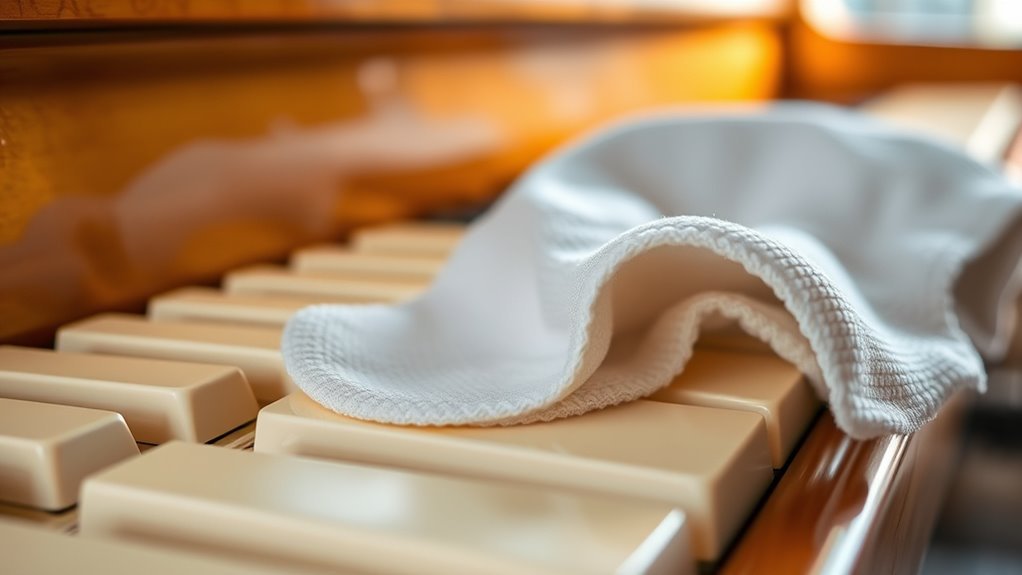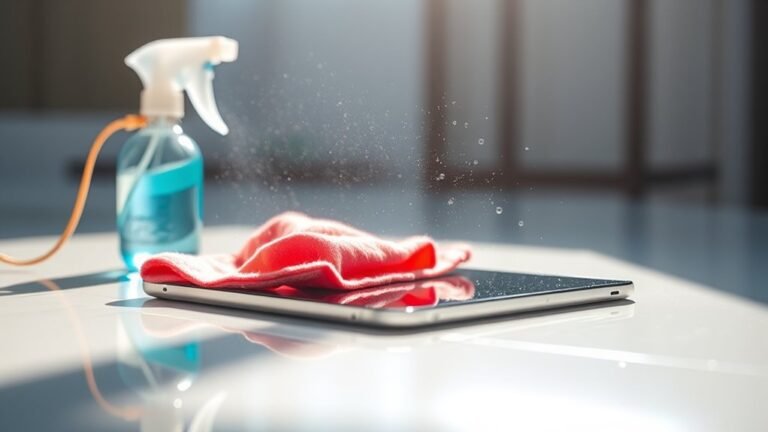How to Clean Ivory Keys on a Piano
To clean ivory keys on your piano, you’ll need soft microfiber cloths, a gentle soap solution mixed with distilled water, and cotton swabs for tight spots. First, dust the keys gently, then dampen a microfiber cloth with the solution without soaking it. Clean each key in a straight motion, removing stains, and dry with another cloth. Avoid harsh chemicals. Regular maintenance every few months and some protective measures can help keep your keys pristine for years to come.
##

If you own an ivory piano and are looking for effective ways to clean and maintain its beautiful keys, you’ve come to the right place. This article will provide you with essential tips and techniques to ensure your ivory piano keys remain in pristine condition without risking damage. You’ll learn about the best cleaning methods, safe materials to use, and maintenance practices that can prolong the lifespan of your piano. By following the advice outlined here, you can keep your ivory keys looking stunning while enjoying every moment of playing.
Preparation For Cleaning
Before starting the cleaning process, it’s important to gather the right materials and set the stage for a safe and effective cleaning session. First, confirm your workspace is well-lit and free of distractions. Create a comfortable environment that allows you to focus on your maintenance routine. Next, identify which cleaning techniques you’ll employ, as this will guide your material selection. You’ll want to have soft, lint-free cloths at hand, along with a gentle cleaning solution. Read through your chosen techniques carefully, and make certain you understand each step. This preparation phase is crucial; it not only maximizes your efficiency but also protects your ivory keys from potential damage. Taking these initial steps sets you up for successful cleaning.
Tools and Chemical Required
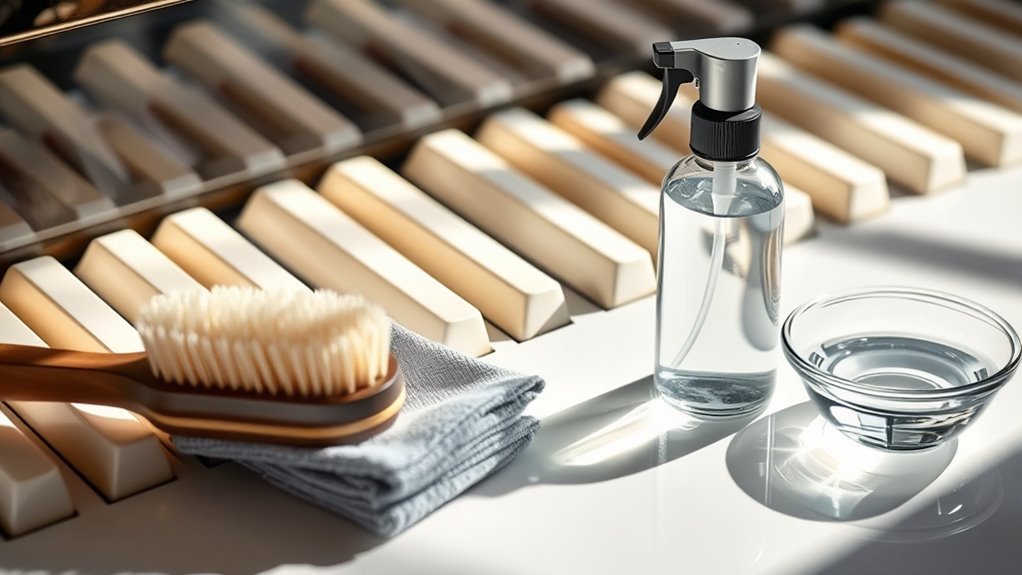
To effectively clean ivory piano keys, you’ll need specific tools and chemicals that guarantee a gentle yet thorough approach. Start with maintenance tools like a soft microfiber cloth, a small soft-bristled brush, and cotton swabs. For cleaning solutions, consider a mild soap mixed with distilled water, or specialized ivory cleaners. Avoid harsh chemicals that could damage the keys. Using gentle, non-abrasive cleaners helps protect delicate surfaces like ivory keys while ensuring effective cleaning.
| Tool/Chemical | Purpose |
|---|---|
| Microfiber cloth | Wipe dirt and grime |
| Soft-bristled brush | Remove debris from crevices |
| Cotton swabs | Clean tight spots |
| Mild soap | Break down oils |
| Distilled water | Rinse and dilute solutions |
Equipped with these tools and cleaning solutions, you can maintain the elegance of your piano’s ivory keys effectively.
How to Clean:
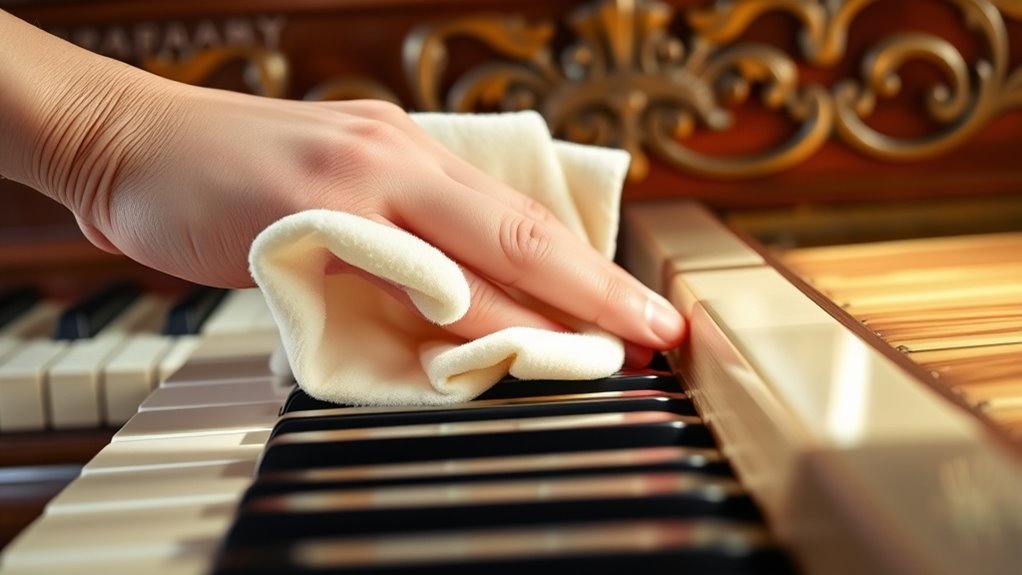
Step 1: Dust the Keys
- Begin by gathering a soft, dry microfiber cloth. This will help you remove loose dust and particles from the piano keys.
- Gently wipe the surface of each ivory key, moving from one end to the other. Avoid using any abrasive materials that could scratch the keys.
- Ensure that you dust all keys, including both white and black keys, to maintain a clean surface.
Step 2: Prepare the Cleaning Solution
- In a small bowl, mix distilled water with a few drops of mild soap. It’s important to use distilled water to avoid any minerals or impurities that can harm the ivory.
- Stir the mixture gently to ensure the soap is evenly distributed in the water.
Step 3: Dampen the Cleaning Cloth
- Take another clean microfiber cloth and dampen it with the soap solution. Be sure to wring it out thoroughly; the cloth should be damp, not soaked.
- Excess moisture can damage the ivory, so take care to avoid soaking the cloth.
Step 4: Clean the Keys
- With the damp cloth, gently wipe each key in a straight motion from one end to the other. Start at one side of the piano and work your way across.
- Pay special attention to any areas that may have visible stains or buildup. For stubborn spots, you can apply a little more pressure, but be careful not to damage the surface.
- Avoid using circular motions, as they may lead to uneven cleaning.
Step 5: Remove Residue
- After cleaning all the keys, take a dry microfiber cloth and wipe down each key again. This will help remove any leftover moisture or soap residue.
- Ensure that all keys are completely dry to prevent any potential damage to the ivory.
Step 6: Regular Maintenance
- Establish a cleaning routine and aim to clean your ivory keys every few months. Regular maintenance helps preserve their beauty and functionality.
- Consider checking for any signs of wear or damage during each cleaning session, so you can address issues early.
Step 7: Protect Your Piano
- To ensure the longevity of your piano, protect it from environmental factors such as direct sunlight, humidity, and temperature fluctuations.
- Use a cover when the piano is not in use and keep it in a controlled environment to maintain its aesthetic appeal and functionality.
Safety Consideration
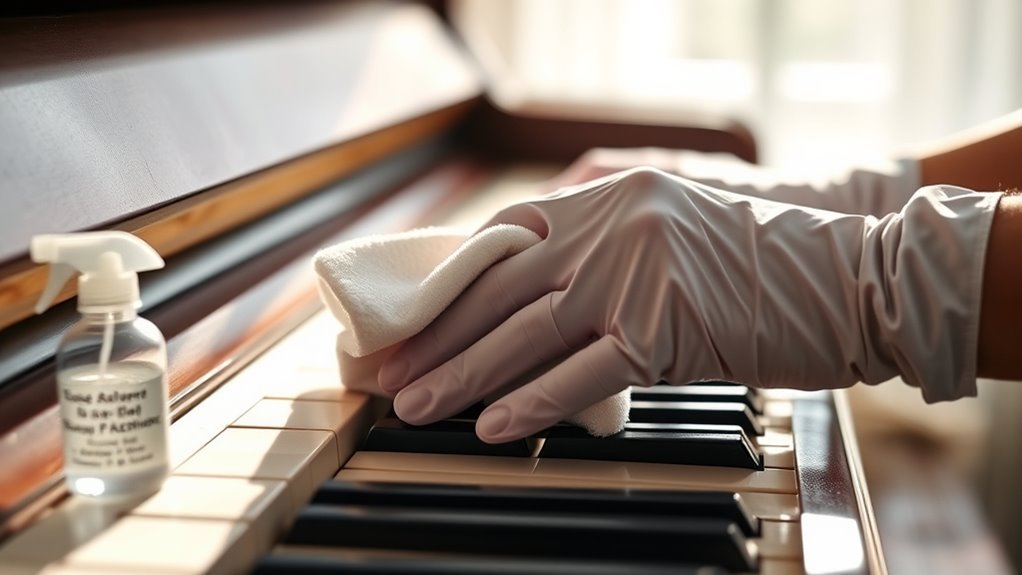
Maintaining the cleanliness of ivory piano keys involves not just the methods of cleaning but also understanding the safety considerations associated with the materials used. To guarantee effective cleaning while minimizing risks, keep these safety precautions in mind:
- Test Cleaning Solutions: Always test any cleaning solution on a small, inconspicuous area first to prevent damage.
- Avoid Harsh Chemicals: Refrain from using ammonia or bleach-based cleaners, as they can deteriorate the ivory.
- Use Soft Cloths: Opt for microfiber or soft cotton cloths to avoid scratching the surface.
- Ventilate Your Space: Ensure adequate ventilation when using cleaning solutions to reduce chemical inhalation risks.
Tips to keep clean for long time
While regular cleaning is essential, implementing proactive measures can greatly extend the cleanliness of your ivory piano keys. Start with preventive maintenance by positioning your piano away from direct sunlight and humidity sources, which can cause discoloration and damage. Consider using a soft cover when the piano’s not in use; this minimizes dust accumulation. Regular dusting with a microfiber cloth helps prevent grime build-up; do this weekly to maintain the keys’ pristine condition. Additionally, keep your hands clean and dry before playing. Avoid eating or drinking near the instrument, as spills can lead to stubborn stains. Finally, schedule a professional deep cleaning annually to guarantee long-term beauty and functionality. Following these tips will keep your ivory keys looking beautiful for years to come. Using gentle, non-toxic cleaners is important when removing any stains to protect the delicate surface and maintain the keys’ condition.
Frequently Asked Questions
Can I Use Vinegar to Clean Ivory Piano Keys?
You shouldn’t use a vinegar solution to clean ivory piano keys. While vinegar symbolizes freshness, its acidity can damage the delicate surface of ivory, leading to discoloration and deterioration. For proper key maintenance, it’s best to use a soft, damp cloth with a gentle soap solution. This method preserves the integrity of the keys while ensuring they remain beautiful and functional, allowing you the freedom to enjoy your instrument without worry.
How Often Should I Clean My Piano Keys?
You should clean your piano keys regularly, ideally once a month, to maintain their appearance and hygiene. This cleaning frequency helps prevent dirt and oils from building up, which can affect playability and aesthetics. For proper key maintenance, gently wipe the keys with a soft, lint-free cloth slightly dampened with water or a specialized cleaner. Avoid harsh chemicals, as they can damage the finish and integrity of the keys over time.
What Should I Avoid When Cleaning Ivory Keys?
When cleaning ivory keys, avoid using harsh chemicals and abrasive materials. These can damage the delicate surface and lead to discoloration or wear. Instead, opt for a gentle, pH-balanced cleaner and a soft cloth. Never use water excessively, as it can seep into the keys and cause warping. Always guarantee your cleaning technique is light and careful, preserving the integrity and beauty of your piano’s ivory keys for years to come.
Do Ivory Keys Yellow Over Time?
Yes, ivory keys do yellow over time due to aging. Think of it like a fine wine maturing; it changes character. This natural process can be accelerated by exposure to sunlight, humidity, and improper maintenance. To maintain your keys, keep them in a controlled environment, avoiding direct sunlight. Regularly dusting them can also help slow down the yellowing process, preserving that classic beauty for years to come.
Can a Professional Clean My Piano Keys?
Yes, a professional can clean your piano keys effectively. Engaging professional services for piano maintenance guarantees that your instrument’s keys are treated with care, preventing any potential damage. They utilize specialized techniques and cleaning solutions tailored for ivory or synthetic keys, restoring their appearance without harming the material. By trusting a professional, you can enjoy peace of mind knowing your piano is in expert hands, allowing you the freedom to focus on your music.
